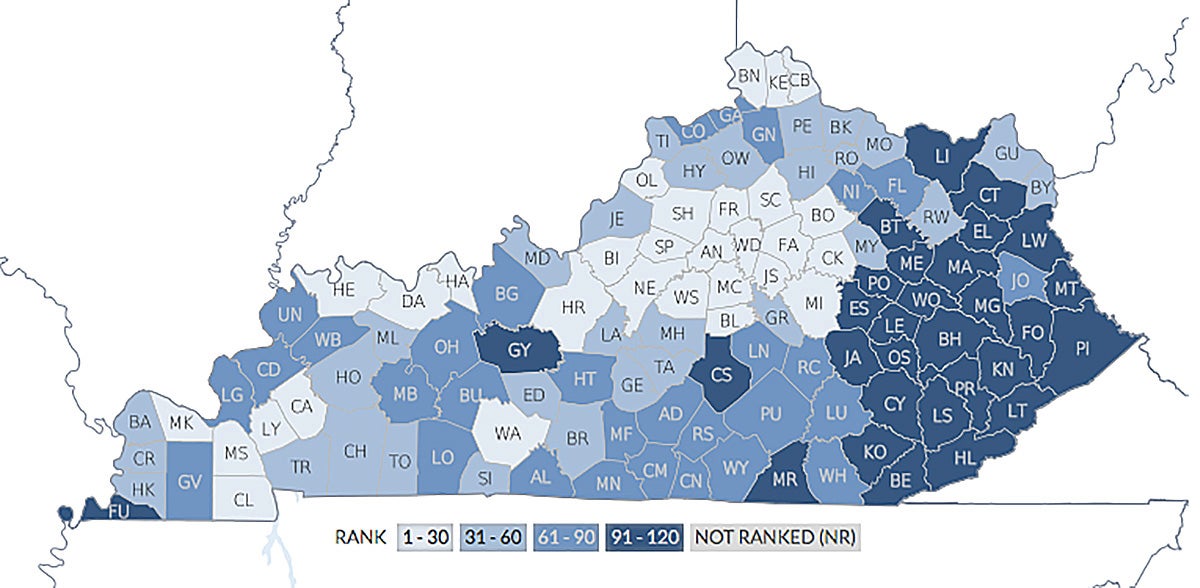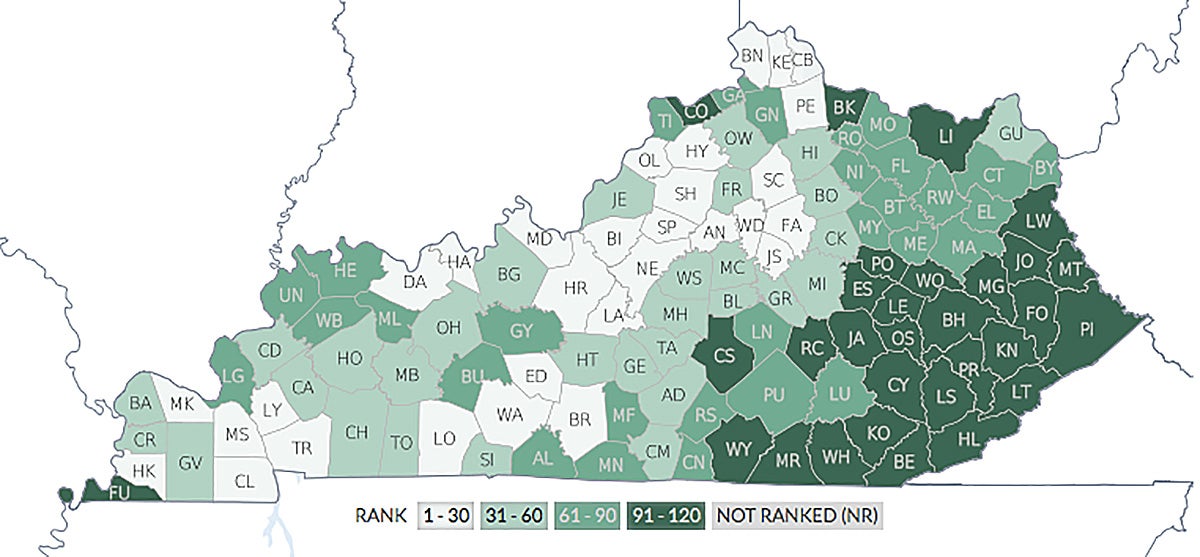Boyle eighth in state for ‘health factors’
Published 7:02 pm Tuesday, March 26, 2019
Boyle County fell 16 spots to 32nd in Kentucky for “health outcomes” on the annual Robert Wood Johnson Foundation County Health Rankings, released this month.
But the county also climbed into the top 10 in the state for “health factors,” indicating Boyle County residents have better health behaviors, better access to quality medical care, less poverty, more education and less-polluted air than most other counties in Kentucky.
Health factors
Boyle County was ranked 14th in 2017 and 12th in 2018 for its health factors; its 2019 rank is eighth. Only Oldham, Boone, Woodford, Campbell, Scott, Spencer and Anderson counties were ranked higher.
The health factors score is determined by a wide variety of statistical data broken down into four areas:
• health behaviors such as smoking, obesity rates, physical inactivity, access to exercise opportunities, excessive drinking, alcohol-involved driving deaths, STIs and teen birth rates;
• clinical care such as the percentage of uninsured, number of doctors, number of dentists, number of mental health care providers, flu vaccinations and preventable hospital stays;
• social and economic factors, such as education levels, unemployment, children in poverty, income inequality, single-parent households and violent crime; and
• physical environment, such as air pollution rates and drinking water violations.
Boyle County has the fourth-best physical environment scores in the state, according to the rankings. The county has seen consistently improving air quality scores since 2005, moving from 14 micrograms of fine particulate matter per cubic meter down to 10 in 2013. In 2014, the most recent year the ranking is based on, Boyle was tied for 52nd out of 120 counties with 10.5 micrograms per cubic meter. That’s better than the state average of 10.7.
Boyle County had no drinking water violations listed in the rankings and outperformed the state average for rates of severe housing problems, long commutes and driving alone to work.
Boyle was 19th in state for social and economic factors. The reported high-school graduation rate of 97 percent exceeded not only the state average of 90 percent, but placed the county among the top performers in the nation. Boyle’s rates of unemployment and people with some college were comparable to the state average.
The county’s child poverty rate is 20 percent, slightly better than the state average of 22 percent. The child poverty rate is 28 percent for black kids and 58 percent for hispanic kids, according to the rankings.
Boyle has less income inequality, fewer single-parent households and more “social associations” than most counties in the state. It also has significantly less violent crime and injury deaths than state averages.
Boyle cracked the top 10 in a second area of health factors as well; in clinical care, the county is 10th.
Boyle has better ratios of doctors, dentists and mental health care providers than the state average. Boyle County had one dentist for every 1,070 people in 2017, far exceeding the state average of one dentist for every 1,530 people and making it again one of the top performers in the U.S. The county also has two-thirds fewer preventable hospital stays than the state average, according to the rankings.
In the health behaviors area, Boyle County was ranked 27th in the state. The county’s adult smoking rate is 21 percent, compared to 24 percent in the state; and its obesity rate is 33 percent compared to 34 percent in the state.
The county is comparable to state averages for physical inactivity, access to exercise opportunities and excessive drinking. About one-third of fatal car accidents in Boyle County between 2013 and 2017 involved alcohol, which was higher than the state average of 27 percent.
Boyle County had a sexually transmitted infection rate in 2016 of 281.8 cases per 100,000 population, due to 84 diagnoses. That puts Boyle well below the state average of 413.2 cases per 100,000 people.
From 2011 through 2017, Boyle averaged 34 teen births per 1,000 teenage females, a slightly lower rate than the state average of 36.
Health outcomes
While many health factors in the rankings continue to improve for Boyle, its ranking in health outcomes fell from 16th last year to 32nd this year.
In the area of quality of life, Boyle was ranked 32nd in 2017, 35th in 2018 and 37th this year. In the area of length of life, Boyle was ranked 14th in 2017, eighth in 2018 and 30th this year.
A major factor in the county’s length-of-life ranking is its premature death rate, measured in years of potential life lost before age 75 for every 100,000 people. Boyle is estimated to have lost 9,200 years of life per 100,000 (which equates to 2,760 years for Boyle’s population of about 30,000) from 2015 to 2017.
But the rankings note the premature death rate can be unpredictable and hard to pin down. “Counties with smaller populations can see a lot of change in their rates of premature death data from year to year,” according to the health rankings’ information page on premature death. “Such changes are usually due to normal variation and are not necessarily caused by any actual change in the underlying risk of premature death in the county.”
Boyle’s error margin for the stat is actually 7,900-10,400 years of life lost. The calculation is made using the ages of people who died in the county and a life expectancy of 75 years. If someone dies at 65, it counts as 10 years of life lost; if someone dies at 30, it counts as 45 years of life lost.
Years of life lost “can be difficult for lay people and public health practitioners to interpret,” according to the health rankings information. “… Further, deaths that occur after the age limit are not accounted for at all. Because of this, (years of life lost) can fail to completely capture the burden of chronic disease.”
Boyle County was comparable to the state average for number of people in poor or fair health and the number of poor physical health days. The county had slightly fewer reported poor mental health days than the state average. About 8 percent of babies born in Boyle from 2011 to 2017 had low birth weights; the state average was 9 percent.








